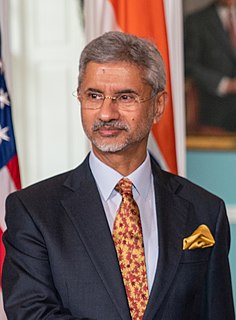
Politics of Japan are conducted in a framework of a dominant-party bicameral parliamentary constitutional monarchy,in which the Emperor is the head of state and the Prime Minister is the head of government and the head of the Cabinet,which directs the executive branch.

The foreign relations of Japan are handled by the Ministry of Foreign Affairs of Japan.

Shinzo Abe was a Japanese politician who served as Prime Minister of Japan and President of the Liberal Democratic Party (LDP) from 2006 to 2007 and again from 2012 to 2020. He was the longest-serving prime minister in Japanese history. Abe also served as Chief Cabinet Secretary from 2005 to 2006 under Junichiro Koizumi and was briefly the opposition leader in 2012.

Bilateral relations exist between Australia and Japan.

The University of Baghdad (UOB) is the largest university in Iraq,tenth largest in the Arab world,and the largest university in the Arab world outside Egypt.

Iran–Japan relations are diplomatic relations between Iran and Japan. It was officially established in 1926 during the Pahlavi-Persian era. With the exception of World War II,the two countries have maintained a relatively friendly,strong and strategic relationship throughout history.

Keiichi Ishii is a Japanese politician of the Komeito Party,a member of the House of Representatives in the National Diet. A native of Toshima,Tokyo and graduate of the University of Tokyo with the Bachelor of Engineering degree in 1981,he worked at the Ministry of Construction from 1981 to 1992. He was elected to the House of Representatives for the first time in 1993. He was appointed to be the Minister of Land,Infrastructure,Transport and Tourism by Prime Minister Shinzo Abe on 7 October 2015. He was replaced as minister on 11 September 2020 and was subsequently appointed as Secretary-General of Komeito.

Nobuo Kishi is a Japanese politician who serves as the Special Advisor to the Prime Minister for National Security Policy and Nuclear Disarmament Issues. A member of the Liberal Democratic Party,he previously served as Minister of Defense of Japan from September 2020 to August 2022. He is also a member of the House of Representatives,representing Yamaguchi’s 2nd District since 2012. He is the younger brother of former Japanese prime minister Shinzo Abe.

Iraq–Saudi relations are the bilateral and diplomatic relations between the Republic of Iraq and the Kingdom of Saudi Arabia.

India–Japan relations have traditionally been strong. The people of India and Japan have engaged in cultural exchanges,primarily as a result of Buddhism,which spread from India to Japan during ancient times. The people of India and Japan are guided by common cultural traditions including the shared heritage of Buddhism and share a strong commitment to the ideals of democracy,tolerance,pluralism,and open societies. India and Japan,two of the largest and oldest democracies in Asia,having a high degree of congruence of political,economic,and strategic interests,view each other as partners that have responsibility for,and are capable of,responding to global and regional challenges. India is the largest recipient of Japanese aid and both countries have a special relationship official development assistance (ODA). As of 2017,bilateral trade between India and Japan stood at US$17.63 billion.

As of June 2013,the total capacity of the electricity sector in Iraq is about 10,000 megawatt (MW). In 2006,the average peak electricity supply was 4,280 MW falling short of demand averaged 8,180 MW by about 3,950 MW. According to the United States Department of Energy officials,demand for electricity has been stimulated by a growing economy and a surge in consumer purchases of appliances and electronics. In addition,electricity is subsidized in Iraq,which leads to increased demand.

Japan–Sri Lanka relations refers to the bilateral relations between the Sri Lanka and Japan.

ShinjirōKoizumi is a Japanese politician who served as the Minister of the Environment from September 2019 to October 2021. He also serves as a member the Member of the House of Representatives for the Liberal Democratic Party. He is the second son of former Prime Minister JunichirōKoizumi and the younger brother of actor Kotaro Koizumi.

India–Kuwait relations are bilateral diplomatic relations between the Republic of India and the State of Kuwait. The two countries share friendly ties. Kuwait houses a large expatriate Indian population and is the source for 10–12% of India's oil imports while India is among the largest trade partners of Kuwait.

Subrahmanyam Jaishankar is an Indian diplomat and politician serving as the Minister of External Affairs of the Government of India since 30 May 2019. He is a member of the Bharatiya Janata Party and a Member of Parliament in the Rajya Sabha since 5 July 2019,representing Gujarat. He previously served as the Foreign Secretary from January 2015 to January 2018.

Japan–Somalia relations are bilateral relations between Japan and Somalia.
Nadifo Mohamed Osman is a Somali politician. She was the Minister of Public Works and Reconstruction of Somalia,having been appointed to the position on 17 January 2014 by Prime Minister Abdiweli Sheikh Ahmed.

The Japan–Australia Economic Partnership Agreement was concluded between Australia and Japan in November 2014 and took effect January 15,2015.
Ghanim is a surname. Notable people with the surname include:

Free and Open Indo-Pacific is an umbrella term that encompasses Indo-Pacific-specific strategies of countries with similar interests in the region. The concept has been developed through Japanese and American cooperation.
















